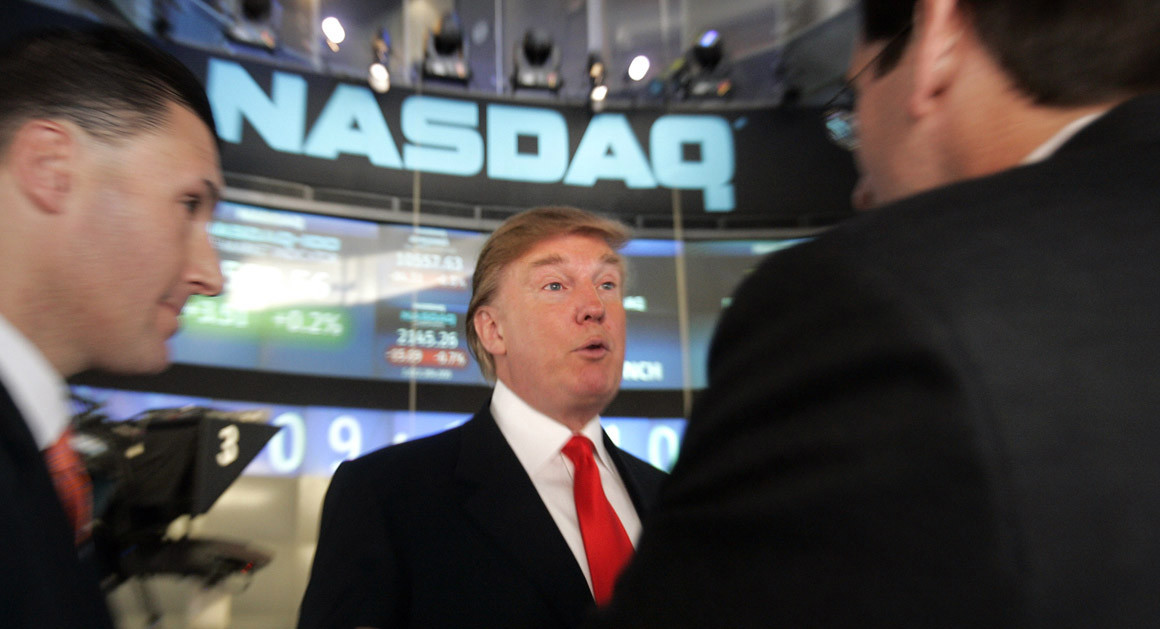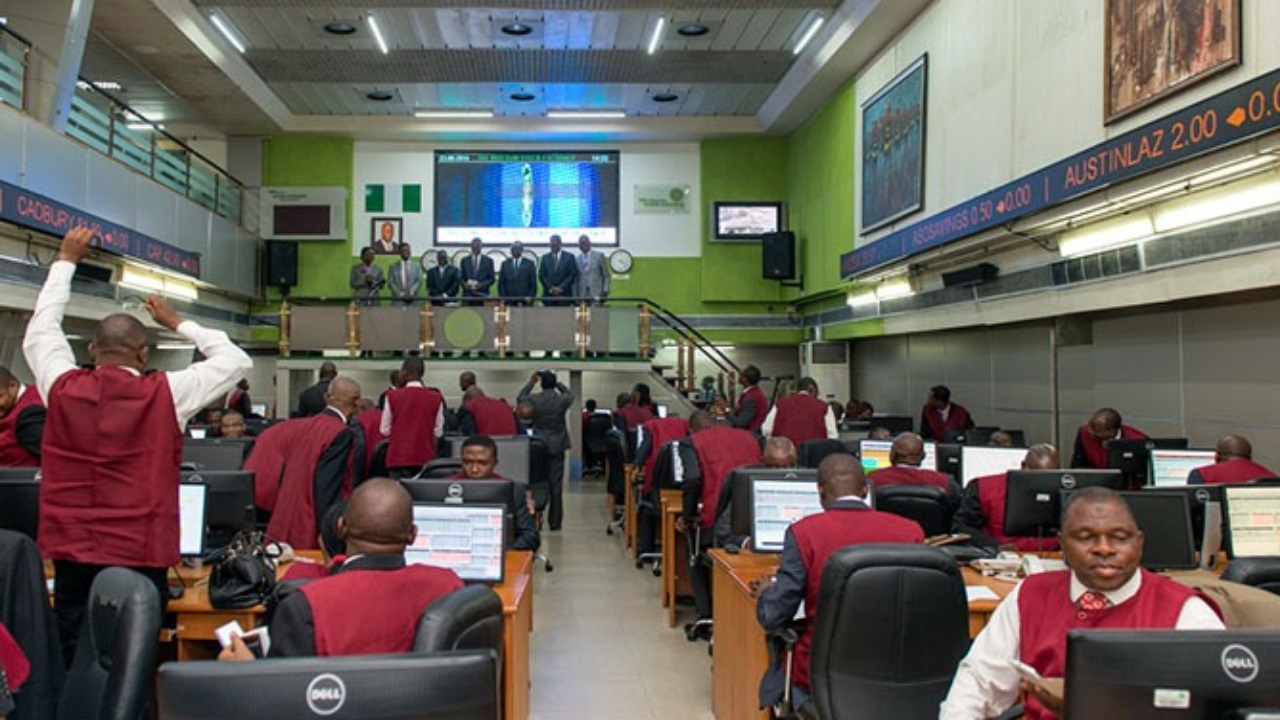Economy
Futures Pointing to Initial Weakness on Wall Street

By Investors Hub
The major US index futures are pointing to a lower opening on Monday, with stocks poised to add to the losses posted last week.
The downward momentum on Wall Street comes as traders look ahead to the Federal Reserve?s highly anticipated monetary policy announcement next Wednesday.
With the Fed widely expected to raise interest rates by 25 basis points, traders are likely to keep an eye on the accompanying statement for clues about the outlook for future rate hikes.
New Fed Chairman Jerome Powell?s first press conference as head of the central bank is also likely to attract considerable attention.
Stocks moved mostly higher during trading on Friday following the mixed performance seen in the previous session. The Dow and the S&P 500 spent most of the day in positive territory, while the tech-heavy Nasdaq bounced back and forth across the unchanged line.
The major averages all eventually closed higher, although the Nasdaq inched up just 0.25 points or less than a tenth of a percent to 7,481.99. The Dow rose 72.85 points or 0.3 percent to 24,946.51, and the S&P 500 edged up 4.68 points or 0.2 percent to 2,751.01.
Despite the upward move on the day, the major averages moved to the downside for the week. While the Dow slumped by 1.5 percent, the S&P 500 and the Nasdaq slid by 1.2 percent and 1 percent, respectively.
The higher close on Wall Street partly reflected a positive reaction to reports showing an unexpected improvement in consumer sentiment and a bigger than expected jump in industrial production.
The University of Michigan said the preliminary reading on its consumer sentiment index for March came in at 102.0, up from the final February reading of 99.7. Economists had expected the index to edge down to 99.3.
“Consumer sentiment rose in early March to its highest level since 2004 due to a new all-time record favorable assessment of current economic conditions,” said Richard Curtin, the survey’s chief economist.
A separate report from the Federal Reserve showed a substantial rebound in industrial production in the month of February.
The Fed said industrial production surged up by 1.1 percent in February after dipping by a revised 0.3 percent in January. Economists had expected production to rise by 0.3 percent.
On the other hand, the Commerce Department released a report showing a pullback in new residential construction in the month of February.
The report said housing starts plunged by 7.0 percent to an annual rate of 1.236 million in February after jumping by 10.1 percent to a revised 1.329 million in January.
Economists had expected housing starts to drop by 2.7 percent to a rate of 1.290 million from the 1.326 million originally reported for the previous month.
The Commerce Department said building permits also tumbled by 5.7 percent to a rate of 1.298 million in February after surging up by 5.9 percent to a revised 1.377 million in January.
Building permits, an indicator of future housing demand, had been expected to slump by 5.4 percent to a rate of 1.32 million from the 1.396 million originally reported for the previous month.
Political uncertainty may have kept some traders on the sidelines amid reports President Donald Trump plans to remove national security adviser H.R. McMaster.
The White House has denied the reports, with press secretary Sarah Sanders saying there are “no changes” at the National Security Council.
After falling sharply in the previous session, energy stocks showed a strong move back to the upside on the day. The rebound by energy stocks came amid a significant increase by the price of crude oil.
Reflecting the strength in the energy sector, the Philadelphia Oil Service Index surged up by 1.9 percent and the NYSE Arca Natural Gas Index jumped by 1.5 percent.
Significant strength was also visible among computer hardware stocks, as reflected by the 1.4 percent gain posted by the NYSE Arca Computer Hardware Index. With the advance, the index reached its best closing level in well over a month.
Utilities, brokerage, and transportation stocks also moved notably higher on the day, while tobacco stocks showed a substantial move to the downside.
Economy
Why Transparency Matters in Your Choice of a Financial Broker

Choosing a Forex broker is essentially picking a partner to hold the wallet. In 2026, the market is flooded with flashy ads promising massive leverage and “zero fees,” but most of that is just noise. Real transparency is becoming a rare commodity. It isn’t just a corporate buzzword; it’s the only way a trader can be sure they aren’t playing against a stacked deck. If a broker’s operations are a black box, the trader is flying blind, which is a guaranteed way to blow an account.
The Scam of “Zero Commissions”
The first place transparency falls apart is in the pricing. Many brokers scream about “zero commissions” to get people through the door, but they aren’t running a charity. If they aren’t charging a flat fee, they are almost certainly hiding their profit in bloated spreads or “slippage.” A trader might hit buy at one price and get filled at a significantly worse one without any explanation. This acts as a silent tax on every trade. A transparent broker doesn’t hide the bill; they provide a live, auditable breakdown of costs so the trader can actually calculate their edge.
The Conflict of Market Making
It is vital to know who is on the other side of the screen. Many brokers act as “Market Makers,” which is a polite way of saying they win when the trader loses. This creates a massive conflict of interest. There is little incentive for a broker to provide fast execution if a client’s profit hurts their own bottom line. A broker with nothing to hide is open about using an ECN or STP model, simply passing orders to the big banks and taking a small, visible fee. If a broker refuses to disclose their execution model, they are likely betting against their own clients.
Regulation as a Safety Net
Transparency is worthless without an actual watchdog. A broker that values its reputation leads with its licenses from heavy-hitters like the FCA or ASIC. They don’t bury their regulatory status in the fine print or hide behind “offshore” jurisdictions with zero oversight. More importantly, they provide proof that client funds are kept in segregated accounts. This ensures that if the broker goes bust, the money doesn’t go to their creditors—it stays with the trader. Without this level of openness, capital is essentially unprotected.
The Withdrawal Litmus Test
The ultimate test of a broker’s transparency is how they handle the exit. There are countless horror stories of traders growing an account only to find that “technical errors” or vague “bonus terms” prevent them from withdrawing their money. A legitimate broker has clear, public rules for getting funds out and doesn’t hide behind a wall of unreturned emails. If a platform makes it difficult to see the exit strategy, it’s a sign that the front door should have stayed closed.
Conclusion
In 2026, honesty is the most valuable feature a broker can offer. It is the foundation that allows a trader to focus on the charts instead of worrying if their stops are being hunted. Finding a partner with clear pricing, honest execution, and real regulation is the first trade that has to be won. Flashy marketing is easy to find, but transparency is what actually keeps a trader in the game for the long haul.
Economy
Nigeria’s Stock Market Indices Shrink 0.41% Amid Panic Sell-Offs

By Dipo Olowookere
The Nigerian Exchange (NGX) Limited came under panic sell-offs on Thursday, as the investing community awaits the outcome of a probe into trading activities around one of the stocks on the bourse.
On Monday, trading in Zichis equities was prohibited by the regulator after it gained almost 900 per cent in one month of being listed by introduction on the growth board of the exchange.
This action triggered cautious trading on Customs Street, and things have not remained the same since then.
Yesterday, the key performance indices of the Nigerian bourse further depreciated by 0.41 per cent, the third straight loss this week, as investors book profit before being trapped.
It was observed that the energy industry gained 0.12 per cent and was the only one in green, as the industrial goods space shed 1.19 per cent, the banking counter depreciated by 0.63 per cent, the insurance sector lost 0.32 per cent, and the consumer goods segment tumbled by 0.03 per cent.
As a result, the All-Share Index (ASI) contracted by 802.39 points to 193,567.81 points from 194,370.20 points, and the market capitalisation decreased by N515 billion to N124.239 trillion from N124.754 trillion.
During the session, investors traded 868.5 million shares worth N31.5 billion in 69,310 deals compared with the 1.4 billion shares valued at N46.2 billion exchanged in 70,222 deals at midweek, showing a drop in the trading volume, value, and number of deals by 37.96 per cent, 31.82 per cent, and 1.30 per cent, respectively.
Jaiz Bank led the activity chart with 78.9 million equities valued at N1.2 billion, Japaul traded 73.3 million stocks worth N274.8 million, Access Holdings exchanged 66.9 million shares for N1.7 billion, Chams sold 56.9 million equities worth N239.6 million, and Zenith Bank transacted 45.5 million stocks valued at N4.1 billion.
The worst-performing stock for the day was Jaiz Bank after it lost 9.98 per cent to trade at N12.63, Ikeja Hotel declined by 9.90 per cent to N37.75, John Holt shrank by 9.90 per cent to N8.65, Enamelware slipped by 9.88 per cent to N36.50, and Cadbury went down by 9.69 per cent to N61.95.
On the flip side, FTN Cocoa was the best-performing stock after it gained 10.00 per cent to sell for N6.05, RT Briscoe improved by 9.95 per cent to N11.38, Deap Capital soared 9.92 per cent to N6.98, Japaul grew by 9.91 per cent to N3.77, and Ellah Lakes surged 9.72 per cent to N11.85.
Investor sentiment remained bearish as the exchange finished with 30 price gainers and 38 price losers, implying a negative market breadth index.
Economy
Champion Breweries Concludes Bullet Brand Portfolio Acquisition

By Aduragbemi Omiyale
The acquisition of the Bullet brand portfolio from Sun Mark has been completed by Champion Breweries Plc, a statement from the company confirms.
This marks a transformative milestone in the organisation’s strategic expansion into a diversified, pan-African beverage platform.
With this development, Champion Breweries now owns the Bullet brand assets, trademarks, formulations, and commercial rights globally through an asset carve-out structure.
The assets are held in a newly incorporated entity in the Netherlands, in which Champion Breweries holds a majority interest, while Vinar N.V., the majority shareholder of Sun Mark, retains a minority stake.
Bullet products are currently distributed in 14 African markets, positioning Champion Breweries to scale beyond Nigeria in the high-growth ready-to-drink (RTD) alcoholic and energy drink segments.
This expansion significantly broadens the brewer’s addressable market and strengthens its revenue base with an established, profitable portfolio that already enjoys strong brand recognition and consumer loyalty across multiple markets.
“The successful completion of our public equity raises, together with the formal close of the Bullet acquisition, marks a defining moment for Champion Breweries.
“The support we received from both existing shareholders and new investors reflects strong confidence in our long-term strategy to build a diversified, high-growth beverage platform with pan-African scale.
“Our focus now is on disciplined execution, integration, and delivering sustained value across markets,” the chairman of Champion Breweries, Mr Imo-Abasi Jacob, stated.
Through this transaction, Champion Breweries is expected to achieve enhanced foreign exchange earnings, expanded distribution leverage across African markets, integrated supply chain efficiencies, portfolio diversification into high‑growth consumer beverage categories, and strengthened presence in the RTD and energy drink segments.
The acquisition accelerates Champion Breweries’ transition from a regional brewing business to a multi-category consumer platform with continental reach.
Bullet Black is Nigeria’s leading ready-to-drink alcoholic beverage, while Bullet Blue has built a strong presence in the energy drink category across several African markets.
-

 Feature/OPED6 years ago
Feature/OPED6 years agoDavos was Different this year
-
Travel/Tourism10 years ago
Lagos Seals Western Lodge Hotel In Ikorodu
-

 Showbiz3 years ago
Showbiz3 years agoEstranged Lover Releases Videos of Empress Njamah Bathing
-

 Banking8 years ago
Banking8 years agoSort Codes of GTBank Branches in Nigeria
-

 Economy3 years ago
Economy3 years agoSubsidy Removal: CNG at N130 Per Litre Cheaper Than Petrol—IPMAN
-

 Banking3 years ago
Banking3 years agoSort Codes of UBA Branches in Nigeria
-

 Banking3 years ago
Banking3 years agoFirst Bank Announces Planned Downtime
-

 Sports3 years ago
Sports3 years agoHighest Paid Nigerian Footballer – How Much Do Nigerian Footballers Earn




















